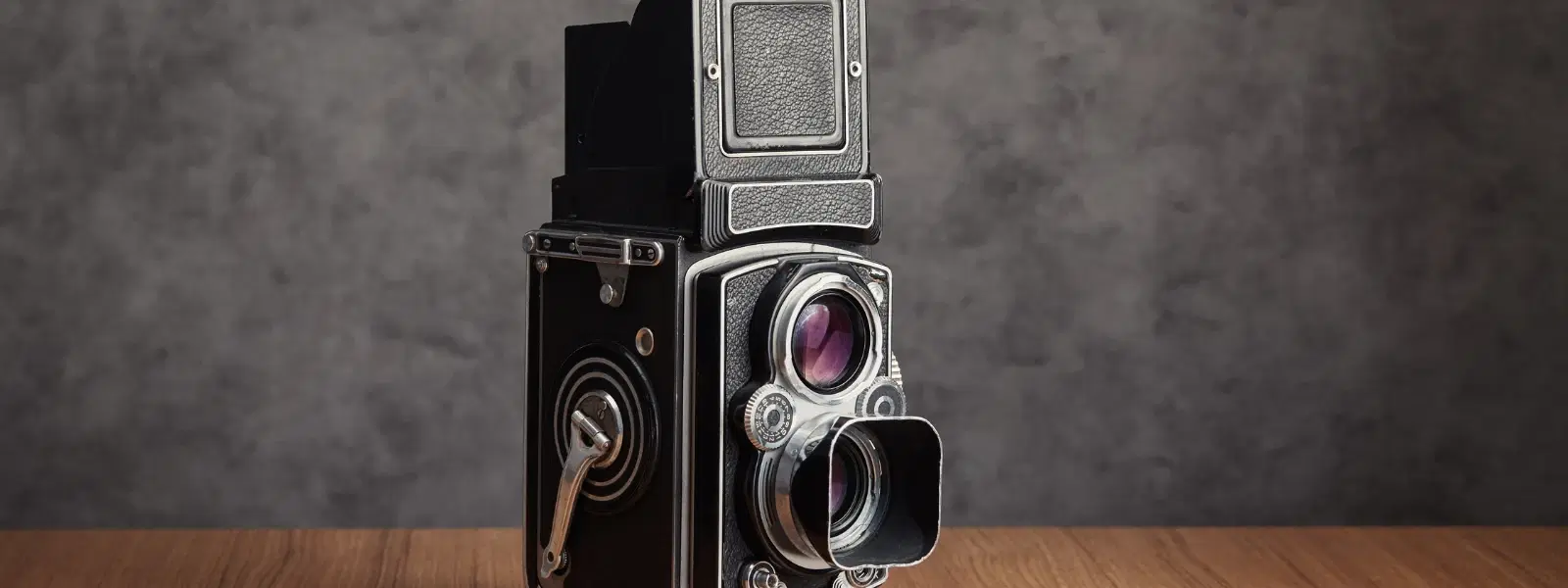
Consumer Electronics
•04 min read
Step back in time and discover the charm of twin lens reflex cameras – vintage photography gear that continues to captivate both analog enthusiasts and professionals. These classic devices are historically renowned for their unique dual-lens system, using one lens for composing a shot and another for capturing the image, delivering a unique waist-level viewfinder experience. In this blog, you will learn the essentials of this iconic photography equipment, its intriguing history, and why it remains a favourite in the realms of medium format photography and film photography equipment.
Twin lens reflex cameras are unique due to their dual-lens design: one lens is dedicated to composing the picture while the other is used to capture the image on film. The design also incorporates a waist-level viewfinder that many enthusiasts appreciate for its direct and engaging way of framing a shot. These devices are typically used in medium format photography, utilising roll film such as 120 film, and they offer manual focus capabilities that enable precise adjustments. These manual focus cameras not only celebrate the retro camera design but also produce stunning twin lens reflex camera photos that appeal to vintage enthusiasts. Their mechanical simplicity and retro aesthetic have made them beloved for generations.
The journey of twin lens reflex cameras began several decades ago. Their popularity surged in the mid-20th century when these cameras provided an accessible yet high-quality option for photographers. Pioneers of this technology laid the foundation for what has become a revered style of camera design, influencing the evolution of analog cameras with their robust construction and distinctive visual appeal. Building on its rich history, understanding the intricate mechanics of these cameras can further enhance your photographic creativity. The legacy of TLRs continues through timeless designs and the enduring popularity of film photography.
The secret behind these cameras lies in their sophisticated, yet straightforward, workings. The waist-level viewfinder allows photographers to compose their shots using a ground glass screen. While this method may introduce a slight parallax error, it encourages a careful and creative approach to framing. The dual-lens system functions with one lens serving as the viewfinder to set up the shot and the other as the taking lens to capture the moment. Additionally, the leaf shutters and adjustable apertures work together to achieve optimal exposure and sharpness, delivering images with a distinctive character.
Expert Tip: How Waist-Level Viewfinders Enhance Creative Photography
Did you know that the waist-level viewfinder on TLR cameras encourages a slower, more deliberate approach to photography? By looking down into the viewfinder, photographers often find themselves composing shots with greater care and creativity.
Opting for a twin lens reflex camera means embracing both technical excellence and artistic flair. The medium format photography capabilities inherent in these cameras often lead to images with higher resolution and impressive depth, making them a preferred choice for those passionate about quality visuals. The retro camera design not only highlights a timeless aesthetic but also provides an ergonomic shooting experience, especially when using a waist-level viewfinder.
Furthermore, many users appreciate the durability and mechanical simplicity of these devices. Their robust construction renders them less dependent on electronic components, which contributes to long-term reliability. Though modern digital cameras come with numerous conveniences, the manual focus and tangible controls of TLRs offer an unmatched, immersive photography experience that remains both challenging and rewarding. When you shop on Tata Neu, you earn up to 5% NeuCoins on your vintage camera purchase, along with express delivery for orders placed before 6pm and unmatched after-sales support.
For those looking to explore the world of vintage cameras further, several models stand out as benchmarks of quality and style. Some of the most celebrated twin lens reflex cameras are known for their build quality and the clarity they deliver. When considering a purchase, it is wise to explore reputed online marketplaces or speciality stores that offer vintage TLR gear. Always ensure you check the condition of the lenses and shutter functionality prior to purchasing, so you invest in a camera that meets your expectations for performance and longevity. Readers can explore more articles on vintage photography and camera care on Tata Neu for added insights.
A twin-lens reflex camera uses two lenses – one for composing the image via a viewfinder and the other for capturing the image on film.
While TLRs are traditionally film-based, some modern digital cameras have been designed to mimic the vintage appeal of the TLR setup. However, these do not employ the dual-lens system in the same manner.
A twin-lens reflex camera uses two separate lenses and a waist-level viewfinder, whereas a single-lens reflex camera incorporates a single lens alongside a prism-based eye-level viewfinder for composition.
The concept of the twin-lens reflex camera was popularised in the early part of the 20th century by innovative photographers and engineers who recognised its potential for quality imaging and creative composition.
The majority of TLR cameras utilise medium format 120 roll film, offering excellent image quality and depth, though some models can accommodate 35mm or 127 film formats.
Twin lens reflex cameras remain an enduring symbol of classic photography gear, celebrated for their distinctive design, medium format capabilities, and the authentic experience they provide. Whether you are a collector, a dedicated film photography enthusiast, or simply someone with a curiosity for vintage cameras, TLRs offer an engaging and rewarding journey into the art of photography. Discover our curated selection of vintage cameras and related accessories on Tata Neu, where technology meets trust and customer-first service. Embrace the opportunity to rediscover the creativity and practicality that these analog tools can inspire in your photographic endeavours.